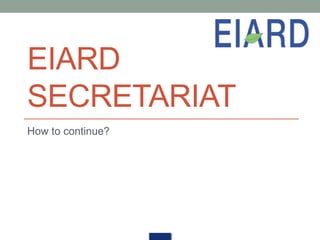Eiard secretariat
- 2. Present situation â status quo Secretariat hosted by DG RTD ïą Ex.Sec. is a 'Seconded National Expert' (SNE) to the EC ïą DG RTD provides an office including equipment and covers EIARD related missions ïą In exchange the Commission is the permanent EIARD Vice-Chair
- 3. Present situation â status quo Advantages ïą The Commission as the neutral broker is hosting the Secretariat and providing the Vice Chairman ïą COM(97)126 on EIARD â recognized by the Council and the European Parliament ïą Established setup (since more than 20 years)
- 4. Present situation â status quo Disadvantages ïą Low interest and ownership of DG RTD in the work of EIARD ïą EIARD is outside the regular EC structure ïą CGIAR funding comes from DEVCO not from RTD (except in the framework of H2020) ïą Conflicting expectations to the position holder ïą RTD sees it as a normal SNE position ïą EIARD work is compromised ïą Restrictive rules for SNEs since 2008 (especially regarding missions, participation in meetings) ïą Recruitment done by Commission only without influence of EIARD
- 5. Scenario Analysis ïą Option 1 â continuation of status quo ïą Option 2 â merger of EIARD with SCAR ïą Option 3 â Secretariat to be hosted by one EIARD member on a rotational basis ïą Option 4 â Secretariat hosted in Bonn back to back with the GDPRD
- 6. Option 1â status quo ïą Search for another person from November 2016 ïą Request that the EIARD chair will be involved in the recruitment process
- 7. Option 2â Merger with SCAR ïą SCAR has an official mandate (Established through a Regulation of the Council of the EU on the coordination of agricultural research the Committee adopted its own rules of procedure in line with those adopted by the Commission on 31 January 2001 and in accordance with Council Decision 1999/468/EC. The Committee was given a revised mandate in 2005 by the Council); ïą SCAR is increasingly addressing global issues ïą The EIARD strategy as a whole could be pursued (not only CGIAR topics);
- 8. Option 2â Merger with SCAR Advantages ïą Overcoming the separation between AR and ARD - lifting ARCH to the next level ïą SCAR: ïą SCAR discussions would increasingly take on board international dimensions ïą EIARD: ïą Higher political mandate, profile and recognition ïą All EIARD strategic areas could be addressed (on top of CGIAR topics) ïą A dedicated WG on CGIAR issues with an own coordinator could be formed which would report back to the SCAR Plenary
- 9. Option 2â Merger with SCAR Implementation ïą No EIARD Executive Secretary needed ïą Closing of ARCH ïą SCAR members would be formed by delegates from national representatives of Ministries of (1) Research+Education, (2) Agriculture AND (3) Foreign Affairs/Development Cooperation ïą EIARD issues discussed at SCAR WG and SCAR Plenary levels ïą Additional SCAR WGs launched to address former EIARD topics ïą CGIAR WG (a coordinator of the group can report every half year to the SCAR Plenary) ïą Others âĶ
- 10. Option 3 â Secretariat hosted by one EIARD member on a rotational basis Advantages ïą Lower financial burden for EIARD member providing the Ex.Sec. â no "lost" position ïą Smaller EIARD members could also host the Ex.Sec. ïą No travel restrictions Disadvantages ïą Outside the Commission â no political mandate
- 11. Option 4 â Secretariat hosted in Bonn back to back to the GDPRD Advantages ïą Vicinity to the GDPRD â better link to rural development ïą Smaller EIARD members could also host the Ex.Sec. ïą No travel restrictions Disadvantages ïą Outside the Commission â no political mandate.











